Lior Shani
Enhancing Personalized Multi-Turn Dialogue with Curiosity Reward
Apr 04, 2025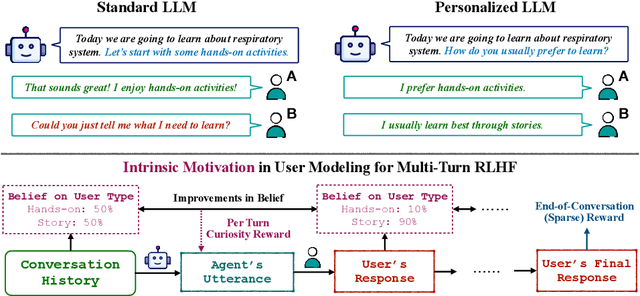

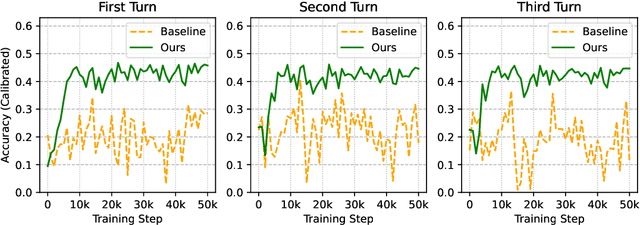

Abstract:Effective conversational agents must be able to personalize their behavior to suit a user's preferences, personality, and attributes, whether they are assisting with writing tasks or operating in domains like education or healthcare. Current training methods like Reinforcement Learning from Human Feedback (RLHF) prioritize helpfulness and safety but fall short in fostering truly empathetic, adaptive, and personalized interactions. Traditional approaches to personalization often rely on extensive user history, limiting their effectiveness for new or context-limited users. To overcome these limitations, we propose to incorporate an intrinsic motivation to improve the conversational agents's model of the user as an additional reward alongside multi-turn RLHF. This reward mechanism encourages the agent to actively elicit user traits by optimizing conversations to increase the accuracy of its user model. Consequently, the policy agent can deliver more personalized interactions through obtaining more information about the user. We applied our method both education and fitness settings, where LLMs teach concepts or recommend personalized strategies based on users' hidden learning style or lifestyle attributes. Using LLM-simulated users, our approach outperformed a multi-turn RLHF baseline in revealing information about the users' preferences, and adapting to them.
Offline Regularised Reinforcement Learning for Large Language Models Alignment
May 29, 2024Abstract:The dominant framework for alignment of large language models (LLM), whether through reinforcement learning from human feedback or direct preference optimisation, is to learn from preference data. This involves building datasets where each element is a quadruplet composed of a prompt, two independent responses (completions of the prompt) and a human preference between the two independent responses, yielding a preferred and a dis-preferred response. Such data is typically scarce and expensive to collect. On the other hand, \emph{single-trajectory} datasets where each element is a triplet composed of a prompt, a response and a human feedback is naturally more abundant. The canonical element of such datasets is for instance an LLM's response to a user's prompt followed by a user's feedback such as a thumbs-up/down. Consequently, in this work, we propose DRO, or \emph{Direct Reward Optimisation}, as a framework and associated algorithms that do not require pairwise preferences. DRO uses a simple mean-squared objective that can be implemented in various ways. We validate our findings empirically, using T5 encoder-decoder language models, and show DRO's performance over selected baselines such as Kahneman-Tversky Optimization (KTO). Thus, we confirm that DRO is a simple and empirically compelling method for single-trajectory policy optimisation.
Embedding-Aligned Language Models
May 24, 2024Abstract:We propose a novel approach for training large language models (LLMs) to adhere to objectives defined within a latent embedding space. Our method leverages reinforcement learning (RL), treating a pre-trained LLM as an environment. Our embedding-aligned guided language (EAGLE) agent is trained to iteratively steer the LLM's generation towards optimal regions of the latent embedding space, w.r.t. some predefined criterion. We demonstrate the effectiveness of the EAGLE agent using the MovieLens 25M dataset to surface content gaps that satisfy latent user demand. We also demonstrate the benefit of using an optimal design of a state-dependent action set to improve EAGLE's efficiency. Our work paves the way for controlled and grounded text generation using LLMs, ensuring consistency with domain-specific knowledge and data representations.
Multi-turn Reinforcement Learning from Preference Human Feedback
May 23, 2024



Abstract:Reinforcement Learning from Human Feedback (RLHF) has become the standard approach for aligning Large Language Models (LLMs) with human preferences, allowing LLMs to demonstrate remarkable abilities in various tasks. Existing methods work by emulating the preferences at the single decision (turn) level, limiting their capabilities in settings that require planning or multi-turn interactions to achieve a long-term goal. In this paper, we address this issue by developing novel methods for Reinforcement Learning (RL) from preference feedback between two full multi-turn conversations. In the tabular setting, we present a novel mirror-descent-based policy optimization algorithm for the general multi-turn preference-based RL problem, and prove its convergence to Nash equilibrium. To evaluate performance, we create a new environment, Education Dialogue, where a teacher agent guides a student in learning a random topic, and show that a deep RL variant of our algorithm outperforms RLHF baselines. Finally, we show that in an environment with explicit rewards, our algorithm recovers the same performance as a reward-based RL baseline, despite relying solely on a weaker preference signal.
Demystifying Embedding Spaces using Large Language Models
Oct 06, 2023Abstract:Embeddings have become a pivotal means to represent complex, multi-faceted information about entities, concepts, and relationships in a condensed and useful format. Nevertheless, they often preclude direct interpretation. While downstream tasks make use of these compressed representations, meaningful interpretation usually requires visualization using dimensionality reduction or specialized machine learning interpretability methods. This paper addresses the challenge of making such embeddings more interpretable and broadly useful, by employing Large Language Models (LLMs) to directly interact with embeddings -- transforming abstract vectors into understandable narratives. By injecting embeddings into LLMs, we enable querying and exploration of complex embedding data. We demonstrate our approach on a variety of diverse tasks, including: enhancing concept activation vectors (CAVs), communicating novel embedded entities, and decoding user preferences in recommender systems. Our work couples the immense information potential of embeddings with the interpretative power of LLMs.
Factually Consistent Summarization via Reinforcement Learning with Textual Entailment Feedback
May 31, 2023



Abstract:Despite the seeming success of contemporary grounded text generation systems, they often tend to generate factually inconsistent text with respect to their input. This phenomenon is emphasized in tasks like summarization, in which the generated summaries should be corroborated by their source article. In this work, we leverage recent progress on textual entailment models to directly address this problem for abstractive summarization systems. We use reinforcement learning with reference-free, textual entailment rewards to optimize for factual consistency and explore the ensuing trade-offs, as improved consistency may come at the cost of less informative or more extractive summaries. Our results, according to both automatic metrics and human evaluation, show that our method considerably improves the faithfulness, salience, and conciseness of the generated summaries.
Reinforcement Learning with History-Dependent Dynamic Contexts
Feb 04, 2023

Abstract:We introduce Dynamic Contextual Markov Decision Processes (DCMDPs), a novel reinforcement learning framework for history-dependent environments that generalizes the contextual MDP framework to handle non-Markov environments, where contexts change over time. We consider special cases of the model, with a focus on logistic DCMDPs, which break the exponential dependence on history length by leveraging aggregation functions to determine context transitions. This special structure allows us to derive an upper-confidence-bound style algorithm for which we establish regret bounds. Motivated by our theoretical results, we introduce a practical model-based algorithm for logistic DCMDPs that plans in a latent space and uses optimism over history-dependent features. We demonstrate the efficacy of our approach on a recommendation task (using MovieLens data) where user behavior dynamics evolve in response to recommendations.
Reinforcement Learning with a Terminator
May 30, 2022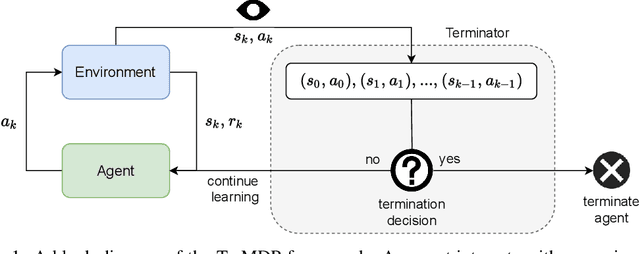
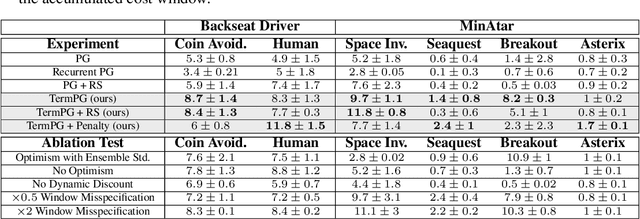
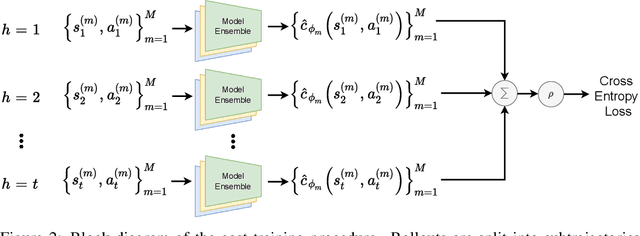
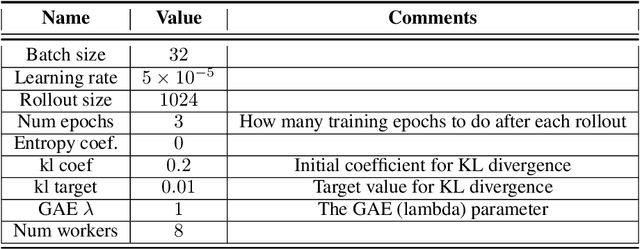
Abstract:We present the problem of reinforcement learning with exogenous termination. We define the Termination Markov Decision Process (TerMDP), an extension of the MDP framework, in which episodes may be interrupted by an external non-Markovian observer. This formulation accounts for numerous real-world situations, such as a human interrupting an autonomous driving agent for reasons of discomfort. We learn the parameters of the TerMDP and leverage the structure of the estimation problem to provide state-wise confidence bounds. We use these to construct a provably-efficient algorithm, which accounts for termination, and bound its regret. Motivated by our theoretical analysis, we design and implement a scalable approach, which combines optimism (w.r.t. termination) and a dynamic discount factor, incorporating the termination probability. We deploy our method on high-dimensional driving and MinAtar benchmarks. Additionally, we test our approach on human data in a driving setting. Our results demonstrate fast convergence and significant improvement over various baseline approaches.
Online Apprenticeship Learning
Feb 13, 2021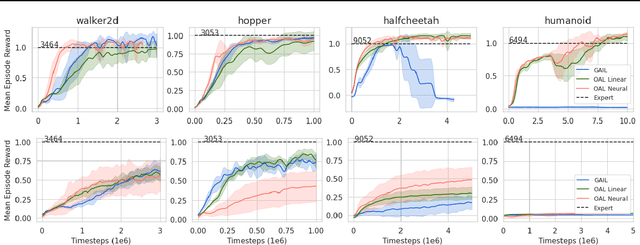
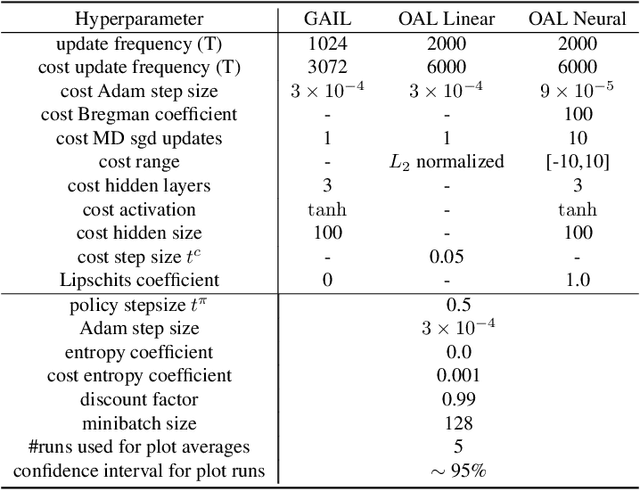
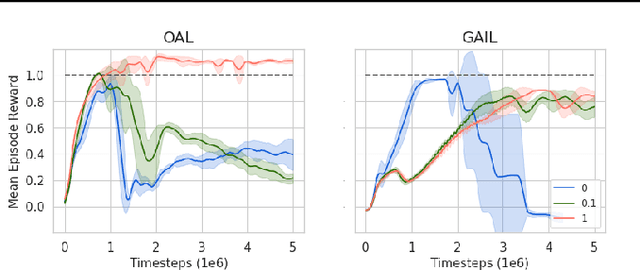
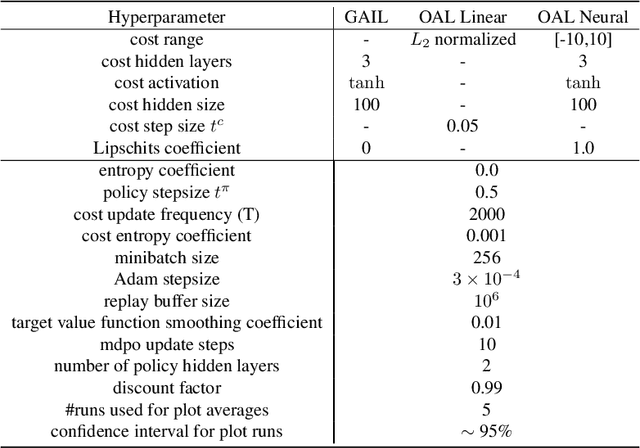
Abstract:In Apprenticeship Learning (AL), we are given a Markov Decision Process (MDP) without access to the cost function. Instead, we observe trajectories sampled by an expert that acts according to some policy. The goal is to find a policy that matches the expert's performance on some predefined set of cost functions. We introduce an online variant of AL (Online Apprenticeship Learning; OAL), where the agent is expected to perform comparably to the expert while interacting with the environment. We show that the OAL problem can be effectively solved by combining two mirror descent based no-regret algorithms: one for policy optimization and another for learning the worst case cost. To this end, we derive a convergent algorithm with $O(\sqrt{K})$ regret, where $K$ is the number of interactions with the MDP, and an additional linear error term that depends on the amount of expert trajectories available. Importantly, our algorithm avoids the need to solve an MDP at each iteration, making it more practical compared to prior AL methods. Finally, we implement a deep variant of our algorithm which shares some similarities to GAIL \cite{ho2016generative}, but where the discriminator is replaced with the costs learned by the OAL problem. Our simulations demonstrate our theoretically grounded approach outperforms the baselines.
Mirror Descent Policy Optimization
Jun 09, 2020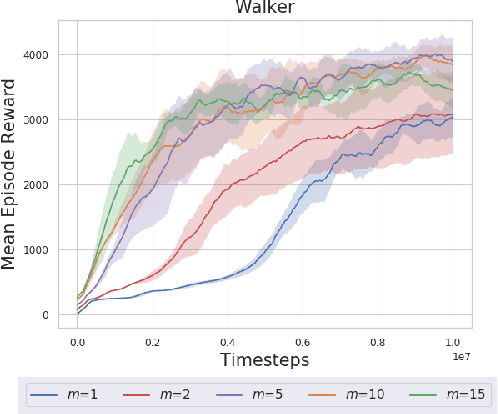

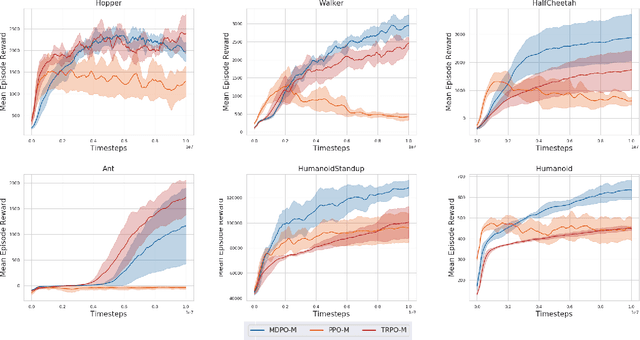

Abstract:We propose deep Reinforcement Learning (RL) algorithms inspired by mirror descent, a well-known first-order trust region optimization method for solving constrained convex problems. Our approach, which we call as Mirror Descent Policy Optimization (MDPO), is based on the idea of iteratively solving a `trust-region' problem that minimizes a sum of two terms: a linearization of the objective function and a proximity term that restricts two consecutive updates to be close to each other. Following this approach we derive on-policy and off-policy variants of the MDPO algorithm and analyze their performance while emphasizing important implementation details, motivated by the existing theoretical framework. We highlight the connections between on-policy MDPO and two popular trust region RL algorithms: TRPO and PPO, and conduct a comprehensive empirical comparison of these algorithms. We then derive off-policy MDPO and compare its performance to existing approaches. Importantly, we show that the theoretical framework of MDPO can be scaled to deep RL while achieving good performance on popular benchmarks.
 Add to Chrome
Add to Chrome Add to Firefox
Add to Firefox Add to Edge
Add to Edge